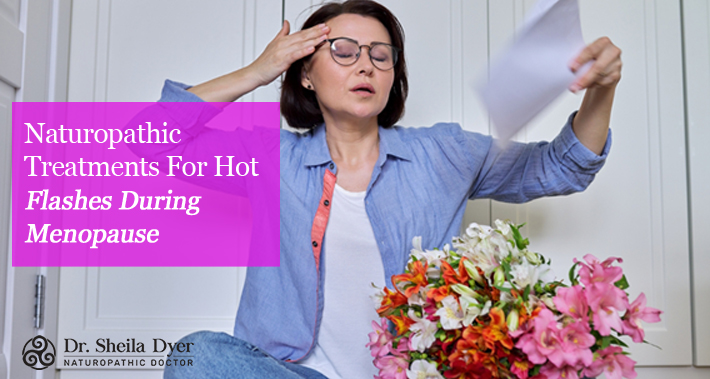Menopause is a transitional period that occurs once you’ve reached the end of your reproductive years.
Unfortunately, menopause often causes several unpleasant side effects.
Perhaps the most notorious menopause symptom is hot flashes.
In addition to being uncomfortable, menopausal hot flashes can also cause their own set of side effects, including:
- Weight gain
- Mood swings
- Depression
- Loss of libido
- Sexual dysfunction
If you’re struggling with hot flashes during menopause, I can help.
I’m Dr. Sheila Dyer, a naturopathic doctor in Toronto with a special interest in natural menopause treatment.
Keep reading to find out more about hot flashes during menopause and how naturopathy can help.
What Are Hot Flashes?
Hot flashes are an intense feeling of warmth that aren’t caused by external sources of heat.
They can occur suddenly or develop over a period of a few minutes.
Several symptoms are associated with hot flashes, including:
- Skin that feels suddenly warm
- Redness on or near your face, neck, ears, or chest
- Upper body sweating
- Tingling in your fingers
- Fast heartbeat
Additionally, many people report feeling chilled after the hot flashes ends.
What Causes Hot Flashes?
Hot flashes are commonly associated with menopause.
However, hot flashes can occur for a number of different reasons.
If you’re fairly certain you’re not experiencing menopause, the cause for your hot flashes may include:
- Certain medications, including Lupron, Novaldex, certain medications used to treat osteoporosis, and some birth control pills
- Hyperthyroidism
- Parkinson’s disease
- Certain autoimmune conditions, like multiple sclerosis
- Migraine
- Severe anxiety
- Certain hormonal disorders
- Certain skin conditions, like rosacea
- Vitamin B3 toxicity
- A urinary tract infection
- HIV
- Tuberculosis
- Eating disorders
- Type 2 diabetes
- Alcohol, tobacco, and caffeine consumption
- Pregnancy
- Obesity
- And many others
As you can see, there are a lot of conditions linked with hot flashes.
As a result, even if you’re confident you’re going through menopause, it’s a good idea to book an appointment with your naturopathic doctor to rule out these other concerns.
Naturopathic Hot Flashes Treatment
Naturopathic medicine is an excellent choice for the management of menopause symptoms, including hot flashes.
Below, I’ve highlighted some of the ways naturopathy can help to lessen the frequency and severity of hot flashes during menopause.
1. Quit Smoking
If you’re looking for a solution to your pesky hot flashes, quitting smoking is an important first step to take.
In addition to helping reduce the frequency and severity of hot flashes, quitting smoking also helps to reduce your risk of heart disease, stroke, and a wide variety of cancers.
So if you needed one more reason to quit, there it is.
2. Black Cohosh
Black cohosh is a native root in North America.
Some research implicates black cohosh as an effective tool for the reduction of symptoms related to hot flashes.
Black cohosh can be found in most health food stores in both capsule and tea form.
Black cohosh is generally safe, but may cause mild side effects, such as a stomach ache or rash.
Additionally, black cohosh shouldn’t be used by individuals with liver disease.
Before you begin taking black cohosh, it’s a good idea to see your naturopathic doctor to make sure it won’t cause any issues with the other things you’re taking.
3.Change Your Diet
Your diet can significantly impact the frequency and severity of hot flashes.
For instance, foods that naturally increase your body temperature, such as spicy foods, have been known to trigger hot flashes.
Additionally, caffeinated beverages, alcohol, and foods that are high in sugar or fat may also trigger or worsen hot flashes.
Try keeping a food journal to figure out which specific foods are triggering your hot flashes.
Research suggests that a Mediterranean diet, which primarily consists of fresh fruits, vegetables, and whole grains, may help reduce the frequency and severity of hot flashes.
Additionally, sipping cold beverages throughout the day can help to cool your body temperature.
Naturopathic nutritional counseling services in Toronto can help.
4. Bioidentical Hormone Replacement Therapy
Bioidentical hormone replacement therapy can be used to help balance your hormone levels.
Since hormonal imbalances are common during menopause, bioidentical hormone replacement therapy can help to reduce the frequency and severity of menopausal hot flashes.
This therapy involves the use of bioidentical hormones which are derived from plant estrogens.
Bioidentical hormone replacement therapy comes in multiple forms, including pills, patches, creams, gels, and injections.
5. Eat More Soy
Soy products can help with the relief of symptoms related to menopause, including hot flashes.
Soy contains lots of phytoestrogens, chemicals that mimics estrogen inside of your body.
Soy is also high in isoflavones, which help bind estrogen receptors, which in turn helps to reduce hot flashes.
Soy naturally occurs in many foods, including:
- Soy based milks
- Tofu
- Tempeh
- Miso
- Edamame
RELATED: Is Soy Good For You?
Book Your Appointment With Dr. Sheila Dyer, ND, Today
Menopause can be challenging, but you don’t have to go through it alone.
Naturopathic medicine utilizes natural remedies to help reduce the frequency and severity of hot flashes without the use of synthetic medications.
If you want to learn more about my services, don’t hesitate to reach out.
Book an appointment today to get started.
If you have questions about naturopathic medicine, or would like to start with your first consultation, contact me, and let’s book an appointment.
Dr. Sheila Dyer, ND1080 Dovercourt Rd,
Toronto, ON M6H 2X8
(416) 554-5135
► https://g.page/DrSheilaDyerNd
Dr. Sheila Dyer is a Naturopathic Doctor and a practicing registered nurse offering holistic healthcare with a scientific focus
